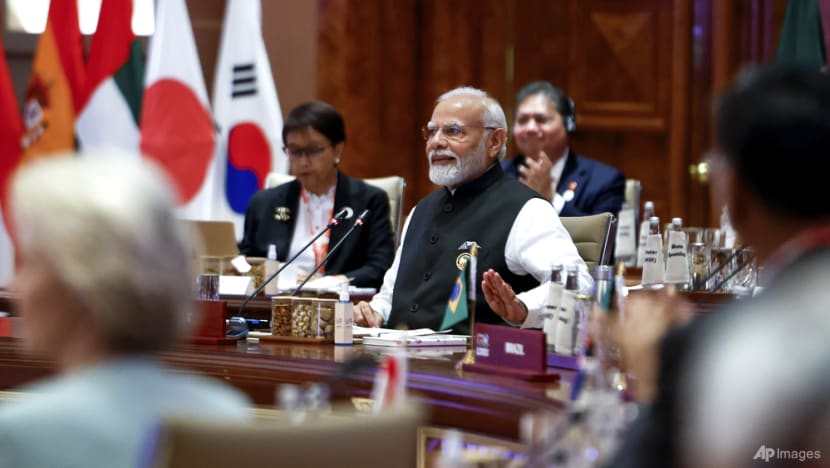New multilateral agreements unveiled on the sidelines of the forum show how New Delhi has been working hard to curtail Beijing’s strategic influence, says international relations expert Ian Hall.

BRISBANE: Chairing a forum as unwieldy as the Group of 20 (G20) is not easy at the best of times. The grouping has no headquarters or secretariat. The G20 chair rotates between the members, leaving the diplomats of whichever country holds it with the unenviable task of organising hundreds of meetings, as well as a leaders’ summit closely scrutinised by the world’s media.
India took on the role after a difficult meeting hosted by Indonesia in Bali in mid-November 2022. That summit was overshadowed, like this one, by Russia’s assault on Ukraine and tensions between the major powers over debt, energy, food, inflation, trade and technology. Indonesia managed to broker agreement on a joint declaration, but only just – and disagreement about the wording on Ukraine resurfaced soon afterwards.
Nevertheless, New Delhi was keen to take on the job.
With a general election pending in 2024, Narendra Modi’s government no doubt saw an opportunity to make the pitch to voters that India is now a respected global player. They will have recognised too that the G20 and all the non-official “engagement groups” that meet alongside it, including the business, civil society, and women’s groups, are useful in showcasing the host to investors and travellers.
But it is clear that New Delhi also calculated that despite the challenging circumstances, there were potential diplomatic gains to be had in chairing the G20.
NO COINCIDENCE CHINA LEFT OUT OF VARIOUS INITIATIVES
First, India perceived a chance to boost its relative influence in the Global South and position itself as a bridge between the West and the developing world.
Soon after the Bali summit, Modi and his equally energetic foreign minister, Subrahmanyam Jaishankar, scheduled calls with their counterparts across the Global South, soliciting their views on what the G20 might do for their countries, and convening a Voice of Global South virtual meeting. In parallel, India tabled a proposal to add the African Union to the forum, which was endorsed at the summit.
Second, New Delhi assessed that hosting the G20 provided a chance to set and pursue agendas that require collaboration but need not involve all the members of the forum. Several of these projects were unveiled on the sidelines of the leaders’ meeting.
The most eye-catching is a deal agreed with the European Union, Saudi Arabia, the United Arab Emirates and the United States to finance and build a so-called India-Middle East-Europe Economic Corridor (IMEC) linking India into the Gulf and beyond.
Another is the Global Biofuel Alliance, launched by Modi alongside the leaders of Argentina, Bangladesh, Brazil, Italy, Mauritius, Singapore and the United States, that aims to develop and promote sustainable biofuels.
The last is a significant agreement between the so-called IBSA group – comprising India, Brazil and South Africa – to work with the United States on the reform of multilateral development banks.
Tellingly, none of these initiatives involve China. This is not a coincidence.
MARKED SHIFT IN INDIA’S CHINA POLICY
Strategic competition between China and India has intensified since Xi Jinping came to power in late 2012. For more than a decade, Beijing has used its economic and military heft to try to influence India’s behaviour and limit its choices, including along the disputed frontier between the two countries.
New Delhi has responded by drawing closer to the United States and its allies and by publicly criticising Xi’s signature project, the Belt and Road Initiative.
These tensions spilled over in mid-June 2020, during the early stages of the COVID-19 pandemic, as Indian troops confronted Chinese soldiers who had earlier seized control of territory New Delhi considers its own. A bloody melee at Galwan in Ladakh left an unknown number dead, prompting both countries to deploy sizeable forces into the area and to upgrade strategic infrastructure on both sides of the so-called Line of Actual Control.
These changes in defence posture were accompanied by a marked shift in India’s China policy. In the early 1990s, both countries agreed not to let the border dispute disrupt other aspects of their bilateral relationship. In 2020, however, New Delhi upended that arrangement, making the withdrawal of Chinese troops and return to the status quo prior to the Galwan clash preconditions to cooperation in other areas.
Since then, New Delhi has also worked hard to stymie Chinese initiatives in both multilateral and minilateral settings.
In July, for instance, as chair of the Shanghai Cooperation Organisation, India shifted the annual summit online, pointedly refused a collective endorsement of the Belt and Road Initiative, and slow-walked efforts to extend security cooperation, crowding the agenda with concerns such as traditional medicine and digital inclusion. In August, New Delhi reportedly vetoed China’s proposal to include Pakistan in an expanded BRICS grouping.
India’s marginalisation of China at the G20 follows on from these efforts to curtail Beijing’s influence. For the moment, they might be working. Some interpret Xi’s refusal to attend the G20 summit as a tacit acknowledgement that the forum no longer serves China’s interests. If that is so, it will be partly due to New Delhi’s hard work, as well as China’s mishandling of a crucial bilateral relationship.
Ian Hall is a Professor of International Relations at Griffith University. He is also the acting director of the Griffith Asia Institute at Griffith University and an Academic Fellow of the Australia India Institute at the University of Melbourne. This commentary first appeared on Lowy Institute’s blog The Interpreter.
